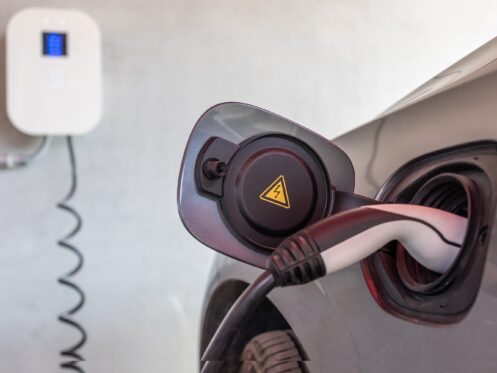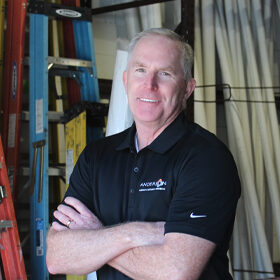Getting an electric vehicle is an exciting time. No more paying the high cost of gasoline, but you still need to worry about charging your vehicle. Many homeowners assume they can plug in their EVs at home with a regular outlet while they sleep. However, it can take up to 24 hours to fully charge. A better option is to have us install a Level 2 EV charger.
Your home’s electrical panel, wiring, and power capacity determine whether your charging experience will be seamless or frustrating. Before you can enjoy the convenience of home EV charging, you need to make sure your electrical system is up to the task. If your system is not ready, you could have tripped breakers, slow charging speeds, or potential fire hazards. Here are a few steps to prepare your home’s electrical system for your electric vehicle.
Step 1: Set Up an Assessment of Your Home’s Electrical Panel
Your electrical panel is the brain of your home’s power system. It distributes electricity to every outlet, light, and appliance in your house. Does it have enough capacity to support an EV charger?
Most modern homes have either a 100-amp or 200-amp panel. If your home is on the lower end with a 100-amp panel, you might be cutting it close, especially if you already have high-powered appliances. Installing a home Level 2 EV charger requires a dedicated 240-volt circuit with a 40-amp breaker. That might not sound like much. However, combined with your existing electrical needs, it could push your panel past its limit.
If you often experience breaker trips when multiple appliances are operating simultaneously, it could indicate that your panel is at capacity. Our electricians can perform a load calculation to determine if an upgrade is needed. They can see whether your current setup can handle the additional demand. If your panel is at capacity, you may need an upgrade to a 200-amp panel or larger. A 200-amp panel gives more breathing room for your EV and any future electrical needs. In some cases, your utility company may also need to upgrade the service line if your home requires more overall power. This can add to the cost and time needed for installation.
Step 2: Choose the Right Charger for Your Needs
Not all EV chargers are the same. A Level 1 charger is a basic option. It uses a standard 120-volt outlet. This is the same type you use for lamps and phone chargers. While it is convenient, this will charge at a slow rate. In most cases, you might only get about three to five miles of range per hour of charging. That might be fine if you drive infrequently, but it is not ideal for daily use.
A Level 2 charger runs on a 240-volt circuit. This is often the best choice for homeowners. No matter what you need, our electricians will install a dedicated circuit to ensure reliable overnight charging.
Step 3: Get a Dedicated Circuit Installed for Your EV Charger
Once you have decided on a charger, the next step is to have our electricians install the proper electrical setup. A dedicated 240-volt circuit is needed to ensure your EV gets consistent power without overloading your home’s system.
Our electrician will upgrade your electrical system with a circuit breaker rated for the charger’s amperage. In most situations, that is 40 amps, but some chargers require 50 or even 60 amps. The wiring must also be able to handle the load. Along with that, the charger itself can either be hardwired or plugged into a heavy-duty outlet like a NEMA 14-50.
If a 240-volt circuit is unavailable, our electricians will install new wiring from the panel to your garage or driveway. With that, you can have safe and efficient power delivery.
Step 4: Get the Necessary Permits and Inspections
Before starting any electrical work, we handle the necessary permit applications and ensure compliance with local regulations. Most areas require permits for installing an EV charger, especially if adding a new circuit or upgrading your panel. Our electrician will handle the paperwork.
Once the installation is complete, an inspector may need to sign off on the work to make sure everything meets safety codes. While it might seem like a hassle, these inspections protect you from potential electrical issues.
Step 5: Think About Your Future Needs
You might want to think long-term if you’re already making electrical upgrades. EV technology is evolving. That could mean that future models may have higher charging demands. If you have a professional installing a dedicated circuit, consider going with a slightly higher amperage than you need right now. In that case, if you upgrade your EV in the future, you will not have to schedule another appointment to redo the electrical work.
Also, if you have multiple drivers in the household and plan on getting a second EV, you might want to have two charging circuits installed. A load-sharing system can distribute power between multiple ports.
Step 7: Have Your System Tested and Start Charging
Once everything is installed, it’s time for the fun part. You can plug in your EV for the first time. Before you do, our electrician will check that your system is functioning properly. They will make sure the charger turns on and delivers power at the expected rate.
After installation, our electricians will provide guidance on monitoring your electrical panel to ensure everything is functioning properly. You need to make sure nothing is overloaded. If your charger has smart features, you might want to set it up to charge during off-peak hours to save on electricity costs.
Many modern chargers have apps that let you monitor charging progress, track energy usage, and even schedule charging sessions. When you explore these features, they can help you optimize your charging experience.
Rely on Our Expertise
Getting your home ready for an EV charger might require some electrical work. Whether you need a circuit installation or a complete panel upgrade, working with our trained electricians is the best way to make sure everything is done safely. While the upfront cost may seem like a lot, our professional team will take the time to prepare your home’s electrical system the right way.
If you want to know what you need for your electric vehicle, contact Anderson Heating, Cooling, Plumbing & Electric in Mentor, OH. We serve the greater Cleveland area, and our electrical services professionals will conduct a full assessment of your home so that you know what you need to accommodate your electric vehicle. We can also help with other electrical needs in your house, including installations and repairs. Contact us today to schedule an appointment with our team.


